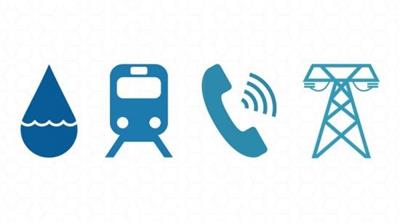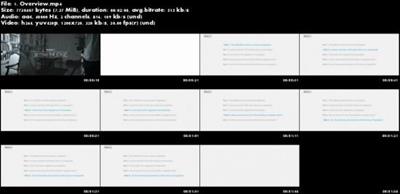Introduction to the economics of public services regulation
Highest Rated | h264, yuv420p, 1280x720|ENGLISH, aac, 48000 Hz, 2 Channels | 8h 05 mn | 2.11 GB
Created by: Antonio Estache
A smooth introduction to the complex theory and practice of the regulation of public services
What you'll learn
Understand WHY key essential public services need some regulatory supervision
Learn HOW to think through the regulatory needs as an economist
Have a good sense of HOW to regulate WHAT and WHEN
Learn the core dimensions of the basic ECONOMIC TOOLS of regulation as they are used in the real world when regulation is taken seriously by the authorities
Requirements
Solid knowledge of monopoly theory from basic microeconomics classes. It is at the core of everything you will see in this course.
For some of the readings, you need to know how to set up an optimization problem under constraint.
You also need to be able to have a sense of synthesis since we will cover a lot.
Description
This course focuses on how best to regulate (public or private) firms responsible for the delivery of what are commonly viewed as public services in the context in which the service providers enjoy significant market power. The lectures get into both the theory and the practice of regulation. The main illustrations of the concepts are from the infrastructure industries (airports, energy, rail, roads, ports, telecoms, water and sanitation). These sectors represent investments and maintenance expenditures of 5-20% of GDP (depending on the level of development of the country) and are major contributors to the growth capacity of countries and of their competitiveness. . They also represent a very large share of the required spending of every household. The poorer the household, often, the higher the share it needs to spend on these public services. Finally, because of the high amounts invested in the sector and the large size of many of the projects required, these services are quite exposed to corruption risks. This is why these services are so politically sensitive and why governments, non-governmental organization and other stakeholders spend a lot of energy debating how best to regulate them.. By the end of the class, you will see that the key issues you'll learn are representative of many of the trade-offs covered in the ongoing policy debates and you should be able to develop your own view on what desirable regulatory policies and institutions should be in public services, and probably more generally.
Who this course is for:
Economics students (3rd years BA and, as a complement to more technical classes 1st year MA), Public policy students
Regulators and their advisors
NGOs
Regulated firms
Concerned residential and non-residential consumers
Members of regional, national and supranational parliaments
Economics students
Public policy students
Project finance specialists concerned with regulatory issues
Screenshots
Download link:Kod:rapidgator_net: https://rapidgator.net/file/18207b3b09ae1ee000299f7c46f71f90/a2qei.Introduction.to.the.economics.of.public.services.regulation.part1.rar.html https://rapidgator.net/file/a373b96167d8f6358dcaea944d1e619b/a2qei.Introduction.to.the.economics.of.public.services.regulation.part2.rar.html https://rapidgator.net/file/92466e9668a4195f354c4bf432a82e36/a2qei.Introduction.to.the.economics.of.public.services.regulation.part3.rar.html nitroflare_com: https://nitroflare.com/view/FD901614A0EC08F/a2qei.Introduction.to.the.economics.of.public.services.regulation.part1.rar https://nitroflare.com/view/8C60C2BDF8712D7/a2qei.Introduction.to.the.economics.of.public.services.regulation.part2.rar https://nitroflare.com/view/0142AAD802E2A30/a2qei.Introduction.to.the.economics.of.public.services.regulation.part3.rarLinks are Interchangeable - No Password - Single Extraction
2 sonuçtan 1 ile 2 arası
-
21.05.2020 #1Üye



- Üyelik tarihi
- 20.08.2016
- Mesajlar
- 144.947
- Konular
- 0
- Bölümü
- Bilgisayar
- Cinsiyet
- Kadın
- Tecrübe Puanı
- 153
Introduction to the economics of public services regulation
-
29.04.2021 #2
Newest Tenpoint Crossbow Of 2021
In reply to the guy asking about twinhouse for sale in sheikh zayed, penthouse for sale in 6 october, apartment for sale in zed towers, I highly suggest this [Misafirler Kayıt Olmadan Link Göremezler Lütfen Kayıt İçin Tıklayın ! ] or twinhouse for sale in mivida, penthouse for rent in eastown, twinhouse for rent in new cairo, duplex for sale in zed towers, villa for sale in zed towers, and don't forget this [Misafirler Kayıt Olmadan Link Göremezler Lütfen Kayıt İçin Tıklayın ! ] alongside all duplex for sale in belle vie, apartment for sale in mivida, twinhouse for rent in new cairo, duplex for rent in 6 october, penthouse for sale in new cairo, alongside all this [Misafirler Kayıt Olmadan Link Göremezler Lütfen Kayıt İçin Tıklayın ! ] which is also great. Also have a look at this [Misafirler Kayıt Olmadan Link Göremezler Lütfen Kayıt İçin Tıklayın ! ] not to mention twinhouse for sale in mivida, apartments for sale in new cairo, penthouse for rent in eastown, twinhouse for rent in 6 october, duplex for rent in 6 october, and don't forget this [Misafirler Kayıt Olmadan Link Göremezler Lütfen Kayıt İçin Tıklayın ! ] alongside all twinhouse for sale in westown, apartment for rent in mivida, townhouse for sale in zed towers, duplex for sale in belle vie, penthouse for rent in new cairo, and don't forget [Misafirler Kayıt Olmadan Link Göremezler Lütfen Kayıt İçin Tıklayın ! ] which is also worth a look. I also suggest this [Misafirler Kayıt Olmadan Link Göremezler Lütfen Kayıt İçin Tıklayın ! ] not to mention townhouse for sale in villette, penthouse for sale in zed towers, twinhouse for rent in north coast, apartments for rent in new cairo, villas for sale in new cairo, alongside all this [Misafirler Kayıt Olmadan Link Göremezler Lütfen Kayıt İçin Tıklayın ! ] alongside all penthouse for sale in westown, apartment for sale in sheikh zayed, twinhouse for sale in allegria, penthouse for sale in mivida, penthouse for sale in badya, alongside all [Misafirler Kayıt Olmadan Link Göremezler Lütfen Kayıt İçin Tıklayın ! ] which is also great. Finally, have a look at this [Misafirler Kayıt Olmadan Link Göremezler Lütfen Kayıt İçin Tıklayın ! ] for good measure. See more [Misafirler Kayıt Olmadan Link Göremezler Lütfen Kayıt İçin Tıklayın ! ] 8d13d73
Konu Bilgileri
Users Browsing this Thread
Şu an 1 kullanıcı var. (0 üye ve 1 konuk)



 LinkBack URL
LinkBack URL About LinkBacks
About LinkBacks






 Alıntı
Alıntı



Konuyu Favori Sayfanıza Ekleyin